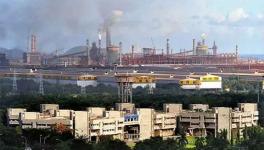Mass Resentment Over Centre’s Proposed Plan to Disinvest NTPC

While the Centre has been gearing up the disinvestment process of NTPC Limited (formerly known as National Thermal Power Corporation), the employees in various plants across the country have continuously been raising their voices against such a move, which will ultimately lead to privatisation of the public sector undertaking (PSU).
At present, the Government of India holds 54.5% stakes in NTPC. As an initial step of disinvestment, the Centre plans to reduce its stakes below 51%.
Though the government has not announced its plans to sell off the PSU "they never denied it", said VK Sharma, the chairman of NTPC Employees Federation of India (NEFI).

"If the government sells its stakes and brings it below 51%, the management’s control will also be transferred which will lead to total privatisation of NTPC," he said.
According to the employees of NTPC, it can be easily concluded from the overall approach of the Centre towards other PSUs that the government’s strategy is to privatise NTPC. They point out that nobody had expected the privatisation of BPCL (Bharat Petroleum Corporation Limited) and CONCOR, but the government has already announced the strategic sale of these profit-making PSUs. So, the NTPC community fears that a similar pattern would follow in their case as well.
Also read: Spectre of Privatisation Now Looms Over IOC, Centre Mulls Reducing Stake to Below 51%
“We have conducted protests and wrote to Ministry of Power and New & Renewable Energy and even approached the Government of India. So far, we haven’t got any reply refuting our concerns,” said Sharma.
While on November 15, thousands of workers including executives and non-executives from various units of NTPC marked their presence in candlelight march which had taken place in respective units against the proposed disinvestment plan. According to NEFI, more than 13,000 people (of the total strength) participated in the march across the country.
NTPC which was incorporated on November 7, 1975, under the Companies Act has now 52 projects/stations including 11 renewable power projects spread across various states. NTPC, a PSU accorded with Maharatna status, has been promoting sustainable energy development in the country and for last seven years, the company has generated profits even after paying taxes to the tune of Rs 76,132 crore.
During the financial year of 2018-19, the total fixed asset of NTPC was Rs 2,16,827 crore generating 22% of country’s electricity with 15% of total installed capacity, says NEFI adding that, during last two decades, its Man-MW ration has reduced from 1.06 to present 0.33, which is at par or even better than the best in the international arena in power sector. The value added per employee in the same period has increased from 0.38 crore to 1.83 crore per employee.
It is also important to note that during the financial year of 2018-19, the employee cost was only 7% of total operational cost. If one checks the figures that the NTPC has paid to the government in various forms since 2000-01, the PSU has been contributing Rs 52,632 crore to the government exchequer as dividend. Apart from this, the company has also been paying the corporate tax.
Also read: BEML Privatisation: Employees to Continue Protest Till Govt Rolls Back Decision
Meanwhile, the Centre has bagged only Rs 27,969 crore through various disinvestment processes within NTPC since 2004.
Though many private companies had ventured in power sector after the economic liberalisation in 1991 and advent of Electricity Act of 2003, most of them have turned into stressed assets. To be precise, 34 projects had turned into stressed assets with capacity of 40,130 MW.
Around 32-35% of energy sector is centralised, while private sector also has the same share of control in the energy sector and rest of the sector is with various state governments.
“Being a leading power utility of the country, NTPC is the back bone of country’s economy and so privatising such a sector would put energy security at great risk,” said Sharma.
Get the latest reports & analysis with people's perspective on Protests, movements & deep analytical videos, discussions of the current affairs in your Telegram app. Subscribe to NewsClick's Telegram channel & get Real-Time updates on stories, as they get published on our website.
























